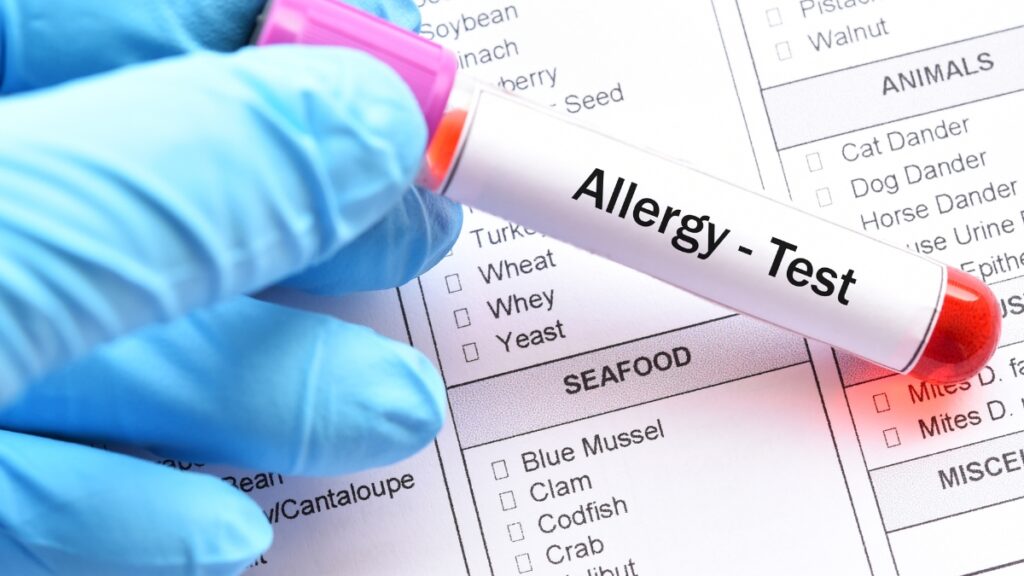The importance of allergy testing lies in identifying what you are at risk of being allergic to, so that you can avoid those triggers accurately and prevent the occurrence of symptoms.
The current methods for testing allergies can be done using a skin prick test and blood sampling to determine the specific levels of immunoglobulin E (IgE), which is directly associated with each type of allergen. In a laboratory setting, doctors can evaluate which substances an individual is allergic to in order to avoid triggering agents, such as specific weather conditions, environmental factors, skin contact, or various foods. This is particularly important for individuals who experience symptoms such as coughing, sneezing, nasal itching, itching around the eyes, redness, hives, or gastrointestinal issues like diarrhea, nausea, and vomiting, without knowing the specific cause or allergen. Conducting allergy tests like this provides high accuracy and helps physicians and patients plan for future prevention or treatment of potential allergic reactions.

What is an Allergy & How does it occur?
Allergy is an exaggerated immune response to substances that are generally harmless to the majority of people. These substances, known as ‘allergens,’ can include pollen, dust mites, certain foods, animal dander, insect venom, or medications. When individuals with allergies come into contact with allergens, their immune system perceives them as threats and responds by producing specific antibodies called ‘immunoglobulin E’ (IgE) to protect the body. These substances can trigger allergic reactions, which can vary in severity and affect different parts of the body. Common symptoms of allergies include sneezing, itching, nasal congestion, runny nose, watery eyes, skin rashes, hives, swelling, coughing, wheezing, and difficulty breathing.
The Progression of Allergies
Allergies can occur at any age and may have a genetic component for certain types of allergies. Some allergies, such as hay fever or seasonal allergies, occur only during specific times of the year, while other allergies, like food allergies, can happen throughout the year. Allergic reactions can range from mild to severe. Severe cases can lead to a life-threatening allergic reaction called anaphylaxis.
“The diagnosis of allergies typically involves evaluating medical history, conducting physical examinations, and performing allergy tests such as skin prick tests and blood tests. Although there is no definitive cure for allergies, there are various treatment methods available to manage symptoms. These may include avoiding allergens, taking medication such as antihistamines or corticosteroids to alleviate symptoms, or, in some cases, undergoing immunotherapy (allergy shots) to reduce the body’s sensitivity to specific allergens.
What are the Methods of Allergy Testing?
- Airborne Allergy Testing or Environmental Allergy Testing:
- This involves testing for allergens both inside and outside the home, such as dust mites, mold, pet dander, animal saliva, animal urine, insect remains, pollen, etc. These substances can cause symptoms like hives, itching, skin rashes, redness, irritation on the face, sneezing, nasal congestion, runny nose, itchy and watery eyes, and difficulty breathing or wheezing.
- Skin Allergy Testing:
- This involves testing for allergens on the skin, often performed in conjunction with airborne allergens. It helps identify specific substances that elicit reactions on the skin, such as redness, dry and scaly skin, intermittent itching, persistent itching, which may worsen over time. Common areas affected include cheeks, face, neck, arms, and legs. It can be caused by allergies to insects, mosquitoes, ants, or reactions to creams and various skin products.
- Food Allergy Testing:
- This involves testing for various types of food allergens that are ingested. It can be divided into immediate food allergies, which cause rapid-onset allergic reactions such as itching, nausea, vomiting, headache, abdominal pain, diarrhea, shortness of breath, etc., and delayed food allergies, where symptoms occur later and are chronic, making it difficult to associate them with specific foods. These types of allergies may not respond to allergy medications.
Note: Please consult a healthcare professional for accurate diagnosis and appropriate allergy testing methods.

Steps in Allergy Testing at Phuket Medical Clinic:
- The doctor begins by taking a preliminary medical history and performing a physical examination.
- It is not necessary to fast or avoid food and water before the allergy test.
- The person being tested should inform the doctor about specific symptoms or suspected allergens in detail.
- The doctor performs a blood test by taking a sample from the elbow or back of the hand, which is sent to the laboratory for analysis.
- The test results are usually available within 5-7 days, depending on the type of test.
In order to be aware of one’s own allergic reactions, it is necessary to be vigilant and observe any abnormalities or symptoms that occur in the body. Paying attention to the details of food intake and the living environment is important because we cannot determine the exact source of the allergen that triggers the reaction. Additionally, each individual may have different symptom profiles, and doctors cannot rely solely on symptoms for diagnosis. Therefore, individuals undergoing testing should try to remember what they may be allergic to and provide accurate details to the doctor, enabling appropriate treatment planning.
Locations for Allergy Testing Phuket, Krabi, Trang, Phang Nga in the southern region of Thailand
If you are looking to get allergy testing for airborne and food allergies in the provinces of Phuket, Krabi, Trang, Phang Nga, or the southern region, we recommend seeking consultation from the expert medical team at ‘Phuket Medical Clinic.’ We are available for service every day from 10:00 AM to 6:00 PM. For inquiries about the testing procedure and service fees, please contact us at 096-696-2449 or book an appointment online in advance for airborne and food allergy testing here.
